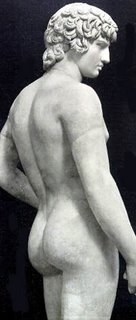Albrechts Flügel Number 2
Monday, January 28, 2008
Tune of the day
Labels:
composition,
music,
tune of the day
Wednesday, January 23, 2008
Stockhausen my Stockhausen

Tomorrow, Thursday at 6 pm PST on Bunnywhiskers, Thom Blum and Jim Bisso and I will be saluting the passing of the gun carriage carrying the mortal remains.
Update: here's the show podcast. The show itself should reach Sirius in 8.6 ± 0.04 years.
Update: here's the show podcast. The show itself should reach Sirius in 8.6 ± 0.04 years.
Labels:
bunnywhiskers,
composition,
music,
stockhausen
Sunday, January 20, 2008
Once there was a boy
Labels:
art,
composition,
mordake,
music,
opera
Saturday, January 19, 2008
Monday, January 14, 2008
Theological, phrenological, surgical
John Duykers performing I'm no murderer from Mordake at Intersection for the Arts, San Francisco, 10th of January 2008. Libretto by Douglas Kearney, directed by Melissa Weaver, production by matt:matt, costume by Kathleen Crowley, with some buzzy extra sounds from Thom Blum, filming by James Bisso, with a backdrop of an altered photo taken by Lynne of a bedroom of the Reutlinger House.
I wrote the gender changing software used at the end - a phase vocoder with formant shifting - for Korporate Marionettes. In this aria, Edvard Mordake tries to shuffle off responsibility for beating his man onto The Other, his shadow, his sister. The text setting in this opera is turning out to be a bit different for me, less driven by the prosody and with more common meters instead of the different-meter-on-every-bar or melodies floating in their own rhythmic world above more regular but still less common meters. Maybe this is because Douglas's words are more poetic and less prose-like than my usual texts. One unintended but happy result is that there is much less need for a conductor.
Labels:
art,
beauty,
composition,
douglas kearney,
john duykers,
kathleen crowley,
mordake,
music,
opera,
poetry
Saturday, January 12, 2008
akin to that of Antinous
 Since the diminution of the Jesuit educational system, we artists can no longer count on the average audience understanding many Western cultural references that used to be taken for granted: the Classical, Mythological, Biblical, Shakespearean former pillars of cultural literacy. However, our librettist, in his bull-headedness, has chosen to ignore this fact, to eschew the requisite references to pop song lyrics and celebrity couplings and instead to rely on some of those very allusions, those facts unavailable to all of us whose education consisted merely of smoking dope in the girl's restroom and leaving thumbtacks on the teacher's chair until that sad day when social promotions pushed us out into the real world, woefully unprepared for highbrow operas. So, to remedy that, I will give a brief rundown of one that appears in the abridgement of Mordake which we are about to witness.
Since the diminution of the Jesuit educational system, we artists can no longer count on the average audience understanding many Western cultural references that used to be taken for granted: the Classical, Mythological, Biblical, Shakespearean former pillars of cultural literacy. However, our librettist, in his bull-headedness, has chosen to ignore this fact, to eschew the requisite references to pop song lyrics and celebrity couplings and instead to rely on some of those very allusions, those facts unavailable to all of us whose education consisted merely of smoking dope in the girl's restroom and leaving thumbtacks on the teacher's chair until that sad day when social promotions pushed us out into the real world, woefully unprepared for highbrow operas. So, to remedy that, I will give a brief rundown of one that appears in the abridgement of Mordake which we are about to witness.In the introduction, in reference to Edward Mordake himself, we find that "his face was that of Antinous." We ask: who is this Antinous? I say to you that he was a beautiful boy who, around about age 11, become the lover of the Roman Emperor Hadrian, in the fashion of the day, following the Greek tradition of the eromenos, to wit, the idealized pederastic relationship between an adolescent boy and an adult man, both best friends forever and pure lovers, seen to be part of aristocratic moral and educational development, military training, and, of course, Intercrural Sex, which you can look up for yourself in any accurate biography of Honest Abe Lincoln. At around age 18, possibly in an attempt to save his beloved emperor, Antinous drowned in the Nile. Hadrian's grief was unbounded and, following in the footsteps of the great Alexander, had Antinous proclaimed a god. Worship was widespread throughout the empire. There were cities named after him, temples built for his worship, festivals in his honor, a constellation named after him (until the regularization of the constellations by the International Astronomical Union in the 1930s), and many
 many statues and coins and busts and gems bearing his likeness, all recording his famous pouting lips, considered his most distinctive feature.
many statues and coins and busts and gems bearing his likeness, all recording his famous pouting lips, considered his most distinctive feature.My favorite quote about Antinous (although unrelated to the story at hand) is this homophobic number from Gibbon's Decline and Fall of the Roman Empire:
The deification of Antinous, his medals, statues, city, oracles, and constellation, are well known, and still dishonor the memory of Hadrian. Yet we may remark, that of the first fifteen emperors, Claudius was the only one whose taste in love was entirely correct.
Friday, January 11, 2008
Mordake Appears
Labels:
beauty,
john duykers,
kathleen crowley,
mordake,
music,
opera,
sexuality
Saturday, January 5, 2008
Finally Stockhausen
Which, since we are starting on a wander, reminds me of my sophomoric and adolescent pseudo-intellectualism where, having been force-fed the Wittgensteinian bologna about the lack of meaning of a private language, I took my recently purchased but yet unlistened-to copy of Daphnis and Chloe and played it for months at 45 RPM so when I finally heard the piece played normal-like, I would have a true private experience. Yes?
But do we all know Stockhausen's origin myth? I happened to see the original quote from the master of Darmstadt on Anablog, and here 'tis:
"I think that the culture of this planet has been mainly formed by visitors from Sirius, especially in the time between 9000 and 6000 B.C...I think that our main sources of present-day culture, as decadent as it may be in most parts of the planet, stem from visitors from Sirius whose main representatives were Isis and Osiris. Through a series of revelations which were at first quite nebulous, but have become more clear during the past few years, I know (as little as I know about details) that I have come from Sirius, myself."
Labels:
bunnywhiskers,
music,
philosophy,
queer,
sexuality
Tuesday, January 1, 2008
My New Year's Resolution
 is to survive from now till a week from Thursday: the Teaser showing of Mordake at the Intersection. It's a homecoming of sorts; I presented my very first chamber opera at the Intersection back in 1995. The Intersection is a beautiful intimate space and it's going to be great fun to put up a section of the piece there, also following the very important plan of getting everyone drunk enough beforehand to appreciate it all properly. But the survival issue comes from having a day job as well as a night job or maybe two lives in two parallel universes. Like Mordake, I can't seem to integrate both in healthy way. So far I've done it by stressing myself to the point of near death, working from morning until night on one and then from night to the week hours on the other, catching a bit of sleep and proceeding again.
is to survive from now till a week from Thursday: the Teaser showing of Mordake at the Intersection. It's a homecoming of sorts; I presented my very first chamber opera at the Intersection back in 1995. The Intersection is a beautiful intimate space and it's going to be great fun to put up a section of the piece there, also following the very important plan of getting everyone drunk enough beforehand to appreciate it all properly. But the survival issue comes from having a day job as well as a night job or maybe two lives in two parallel universes. Like Mordake, I can't seem to integrate both in healthy way. So far I've done it by stressing myself to the point of near death, working from morning until night on one and then from night to the week hours on the other, catching a bit of sleep and proceeding again.The piece seems to be getting darker as we go further in. Maybe it's finding the horror tale it always was, that in our delight at working together we lost sight. I am seduced by the sounds and the music and the look and feel of it all, but it's been pulling me apart as well to face my dark self, waking up in a sweat in the night, just as children tremble and fear all
in the viewless dark.
Labels:
depression,
mordake,
music,
opera
Subscribe to:
Comments (Atom)





